Gone are the days when drinking beer and playing sports defined a man. With changing times, the distinctions between masculinity and femininity is blurring, and for good. As we know, “Life imitates art and art imitates life.” The changing definitions of masculinity have led to a more evolved portrayal of male characters in sitcoms. What does a modern man look like? How does he behave? Let us take a look at the evolution of the men in modern American sitcoms.
Shift in the Representation of Masculinity in Brooklyn 99
Jake Peralta from Brooklyn 99 is the first man under the scanner. In the season 5 episode where Jake and Amy work on their last case before Amy becomes a sergeant, Melvin Stermly’s appearance leaves Jake jealous. He tries to fight it throughout the episode calling it “an ugly emotion” but he gives into it halfway through, leading to him almost botching up their investigation. When Amy calls him out, he admits that he was a little jealous of “the super smart super model”. Amy assuages his fears and by the end of the episode Jake has made peace with it. Here is a portrayal of masculinity as adapting and evolving.
Another example is when Jake agrees to do the pre-wedding tasks on his own so that Amy could go after her old nemesis.
Meanwhile, Ross from the popular 90’s show FRIENDS takes a distinct approach, reflecting a different brand of masculinity. Hint: It is toxic. When Ross gets jealous because of the presence of another guy in Rachel’s life he gets territorial and never apologises to Rachel for it and that, coupled with his infidelity, ultimately leads to their break-up.
Another couple from Brooklyn 99 is Captain Raymond Holt and Professor Kevin Cosner. Both of them are portrayed as absolute no-nonsense, very good at their jobs and can best anyone in an intellectual conversation. They are mostly shown as partners with no toxic complexes.
Yet, in season 6, Captain Holt is shown as flustered, stumbling over objects and under-confident and for this, the makers call him a ‘bimbo’ – a colloquially used derogatory term for women.
Yet, in the season 6 episode ‘The Bimbo’, the generally competitive and confident Captain Holt is seen struggling with the feelings of intellectual inferiority in front of Kevin’s colleagues. He is shown as flustered, stumbling over objects and under-confident and for this, the makers call him a ‘bimbo’ – a colloquially used derogatory term for women.
Meanwhile, Terry Jeffords’ appearance might be the textbook definition of machismo, he is in fact proudly feminist. He’s affectionate and respectful towards his wife. His fatherhood involves care and emotionality – aspects often associated with women. His whole family-man persona is such a refreshing change from the common trope of men complaining about their “nagging” wife and “rowdy” kids.
At the start of the show it is revealed that Terry is not allowed into the field until he gets the go-ahead by the therapist in his departmentally mandated psych evaluation, due to his crippling fear of losing his life on the field and leaving his newborn daughters fatherless. Throughout the initial half of season 1 we see him working through the issues with the therapist. He’s shown crying and admittedly vulnerable.
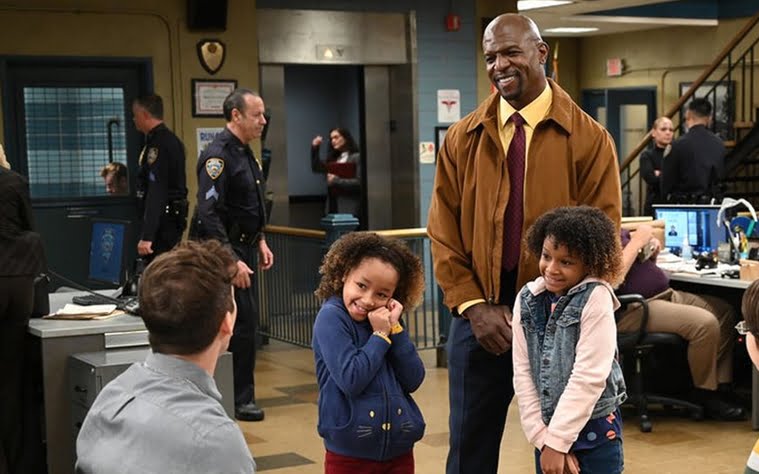
Also read: Kabir Singh: The Poster Boy For Toxic Masculinity
Male friendships are also arenas which expose the wide spectrum of masculinity. Charles Boyle and Jake Peralta’s bond is among the non-toxic male friendships portrayed on TV.
The show starts off with Jake being a wannabe rebel man-child, but over the seasons under the watchful gaze of Holt, in a loving relationship with Amy, he becomes more mature and better in touch with his emotions. Meanwhile Charles Boyle is a foodie who wears his heart on his sleeve. He is not afraid to express his immense love for his best friend Jake for whom he has almost child-like admiration. Jake too, cares deeply for Charles and is by his side loyally. Male friendships are often shown as lacking depth and emotional involvement. In a fresh departure from that, the men of Brooklyn 99 are friends through thick, thin and the mundane.
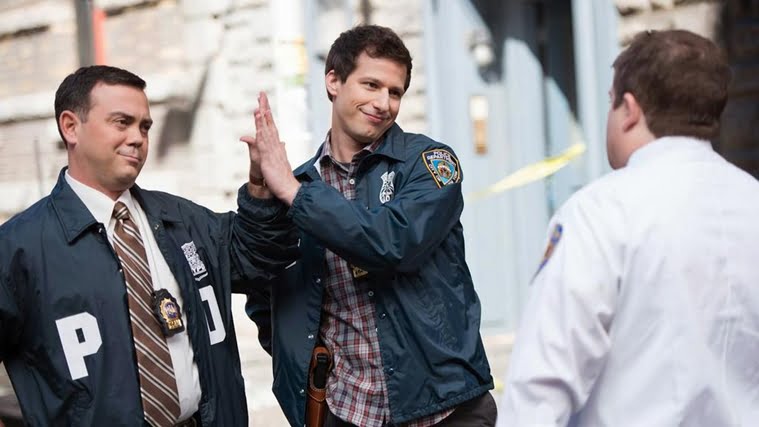
However, the scene in which Jake and Charles sit in a car and look through binoculars to hide that they are crying over how it might be their last case, is another time the show reflected stereotypes. It is a reflection of how entrenched society’s pressure on “how real men should not cry” is.
New Girl and its Refreshing Take on Masculinity
When it comes to guy friendships, Nick and Schmidt from New Girl is another case study.
In a Season 5 episode, Schmidt tells his fiancé Cece that he wants a Tokyo themed bachelor party- a spa day with Hot Springs and Cherry Blossoms. Like a lot of things about Schmidt’s character, this is something that’s traditionally not expected from a man. Seconds after, a man comes screaming at their car and suddenly Schmidt changes his mind and asks for a road-trip “like a man”. Nick does everything he could to make Schmidt feel “tough”. He even feigns pain when he shakes hands with Schmidt, following it up with “you’re the butchest man here”.
But after a fight in a bar when things go awry, when Nick asks Schmidt why he was so affected by the shouting man, Schmidt replies that he needed to prove to himself that he can “defend” Cece. At the end of this fight Nick tells Schmidt that while he might not have made a good husband in the olden times, he would make a fine “modern husband”.
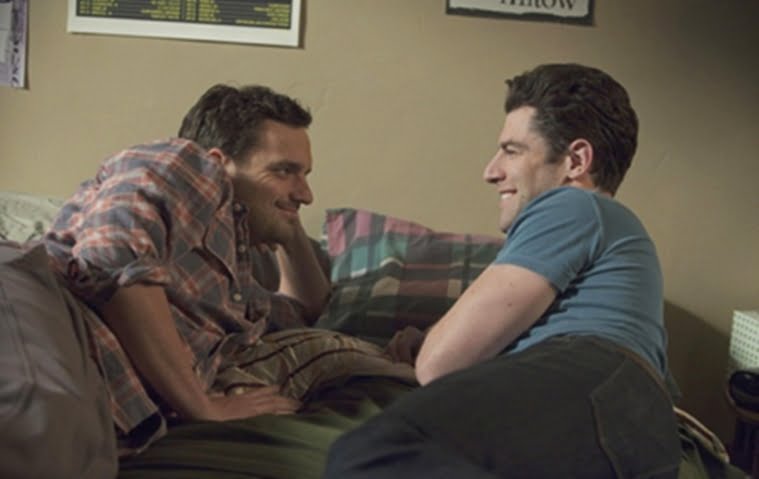
Nick tells Schmidt that he knows he is going to be a good husband to Cece because he was a good husband to him (Nick) for years. He follows this up by practicing a few Karate kicks, because hyper-masculinity prohibits men from feeling so deeply. This is a trope that shows have been using to balance two men getting close emotionally. This continues to be the case, but now most of it is self-aware and satirical.
Another scene is when Jess is out for the night and the guys plan a “guys’ night” stocking up on beer and meat. However, as the night progresses, they emotionally bond over discussing their deepest insecurities, listen to 1980s love songs and sip on sangrias.
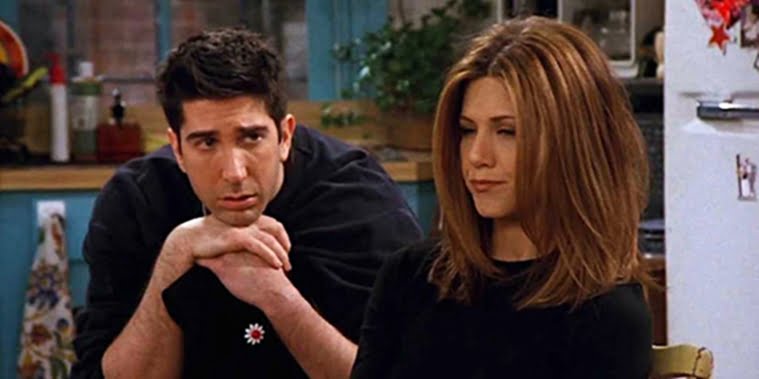
Over the years we’ve seen that the American TV has had a learning curve when it comes to understanding masculinity effectively. Men do not have to play tough or broody, love a sport or trash talk about women to be masculine anymore. Meanwhile FRIENDS – the sitcom we all grew up on, is a study on toxic masculinity. Throughout the show Ross’ toxic complexes are played up for laughs and not addressed maturely. The season 9 episode where he gets rid of Emma’s nanny because he was “too sensitive” for a man or when he tries to get Ben to lose his interest in Barbies because it’s “unbecoming of a boy” – easily come to mind. The show also has other problematic narratives built on transphobia and body-shaming.
Also read: Bollywood’s Tryst With Toxic Masculinity
On the other hand, shows such as New Girl and Brooklyn 99 steer away from toxic masculinity while also portraying its characters realistically. Characters such as Schmidt, Nick, Jake, Charles, Terry and Captain Holt bring a diverse range of masculinities to the table – as how it really is when we look around ourselves.
Characters such as Schmidt, Nick, Jake, Charles, Terry and Captain Holt bring a diverse range of masculinities to the table – as how it really is when we look around ourselves.
For critically acclaimed prime-time shows to depict characters embodying a newer, empathetic masculinity, as opposed to hyper-masculinity or effeminacy, is important not only because they are not setting the latter as standards, they are getting closer to reality. Let’s hope this shift will inspire more men become comfortable in expressing themselves. Let’s leave the Chandlers and Ross’ behind and hope for a future of more Jakes, Charles’ and Schmidts.
Mahima is a student of third year integrated MA in Development Studies. She loves binge watching shows, reading, watching cricket, going down a YouTube rabbit hole and when she’s not procrastinating, writing. She takes a special interest in sociology, political sciences, feminism and queer studies. She feels calm around water bodies and is very scared of heights. She is also extremely passionate about women’s rights. In her free time, you will find her practicing on her ukulele and fangirling over fictional characters. You can find her on Twitter and Instagram.
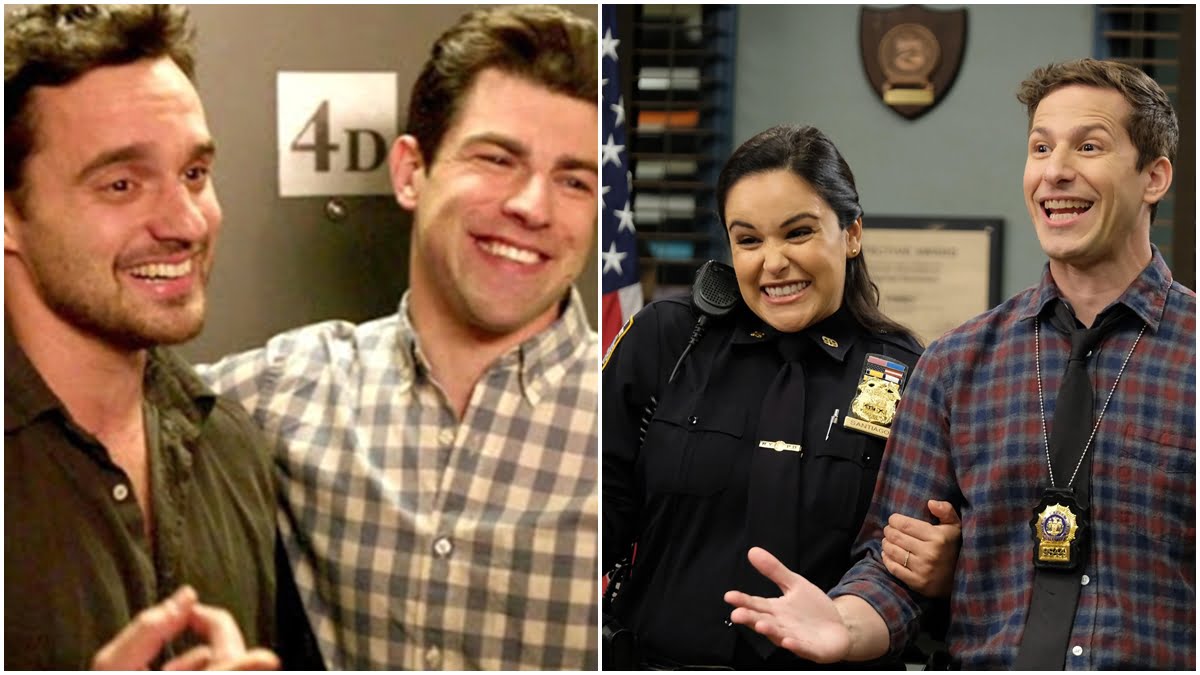




Love Brooklyn 99!!
Nine-Nine !
Decir que Ross es el claro ejemplo de la masculinidad…precisamente cuando fue una de las primeras series en mostrar el lado femenino de los hombres (se ponen crema hidratante, pasan días deprimidos cuando lo dejan con una chica…),en fin, es no tener ni idea de que va la serie de Friends.
Por otro lado, Ross no es tóxico porque sea celoso, porque de celosos hay de hombres y de mujeres. Por si acaso os ponéis nerviosas soy mujer y, no, no vivo a la sombra de ningún hombre. Tengo hijos por voluntad propia (si, se pueden tener), tengo una carrera (no,no soy una paleta de pueblo) y trabajo de lo que me gusta.
Dejad de comparar series de los 90 con series del 2015. No tienen nada que ver y aun así las de los 90 os podrían enseñar mas sobre el amor y la amistad de lo que hacen hoy en día.
I’m glad masculinity is evolving. I hope it continues. But comparing different era’s isn’t accurate or fair.
First things first I wanna be clear. Ross actually did have a real concern if you remember mark asked rachel out after they broke up and he had feelings for her. Second thing, both the “masculinity” of jake and Terry in some way or another are derived from their women which is like very shitty concept. To understand better just switch the genders like someone’s womanliness can’t be derived from a man’s perspective. And also how can you ignore when in b99 Gina objectfies Terry almost constantly when especially when she made Terry dance in his tank top just so she could look at his pecs? I mean is objectification wrong for women only?! Please whenever watching a show look from an unbiased point of view
Please don’t bring up Ross here. He had already lost Carol to Susan, when he put too much trust on his wife. His wife was cheating, she took away everything in the first episode, and she is still portrayed as a character worth any respect? Ross did not want to commit the same mistake again. If only Rachel had taken some time out to have a talk about Mark with him, this would not have happened. Ross says in their quarrel that he is “tired of having a relationship with your answering machine.” Rachel does not take out time to be with Ross, and still she expects to be in a relationship? Rachel is a spoiler brat, who first lived off her father. And it’s a sitcom, or else she wouldn’t have lasted a second in the real world.
This is a very interesting article. I love how Brooklyn nine subverts it’s tropes for the better.
Damn, i strongly disagree with you on many points but you have to understand the reason friends was popular is because it was a reflection of society back then and it was quite a few years ahead of its time. We shouldn’t criticise art based on its handling of stereotypes or how forward they are in their thinking because society has a lot to do with that. We see Ross as toxic now because now, feminine masculinity is the new cool. At that time, you would have seen nothing wrong with Ross. You also have to understand, being territorial was just one of Ross’s traits but he was a far way from being a toxic man. He was sensitive and didn’t hide his feelings. He was timid and didn’t care if people thought he was overly sensitive. If you were in that time, you would have praised his character comparing it to other characters in the past simply being a reflection of society at that time.
In finality, criticism is important but when you criticise something old or not relevant in modern society you have to take into account the societal norms back then and the cultural context behind that art.
I’d love to tweet this tho. Can I?
Dude, i was waiting for somebody to say that. Both these shows are a reflection of the society in their times. Now, because of metoo if women get objectified, the allegations are endless but objectification of men is encouraged. Nothing against feminism but these extreme feminists are such hypocritics.
Wow, seriously, I’ve never left a comment on a review/essay before, but well done! I can’t remember the last time I read a review/essay this good. Thank you!
Wow,how come nobody mentioned Dexter
Well, though Ross and Joey were stereotypes men, Chandler was different. He had a really healthy relationship with Monica. But then as it is a sitcom, every little thing was exaggerated and made funny.
Amazing article. I never really liked Ross much.
I seriously loved this article. There are so many points mentioned here which came to my mind after re watching these shows after growing up a little and having more knowledge about these subjects. They are many new insights presented as well.
LOVE IT❤️❤️.
Ross is admittedly a tool. However, he didn’t cheat on Rachel. She broke up with him, you don’t get to pause people. She was the one who wanted to ‘take a break’. So she walked away from that relationship and that left Ross free to do whatever he wanted. He made a dumb choice by sleeping with the first person he saw, but he was trying to deal with the emotional fallout from having the love of his life dump him after he was upset she had been neglecting their relationship.
I couldn’t agree more with you. Furthermore she demands of him later in the show to admit that he was the only one responsible for everything that went wrong in their relationship. She was the toxic one. Afterwards she even destroyed his marriage with Emily and he refused to stop seeing Rachel because they were friends. I don’t see any toxic behaviour here on Ross’s part